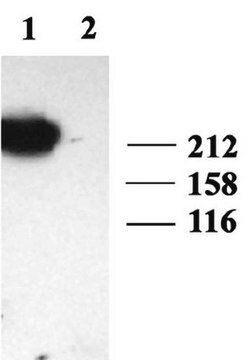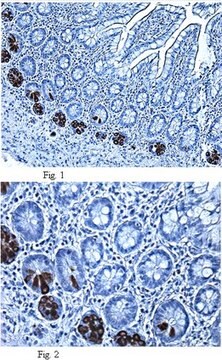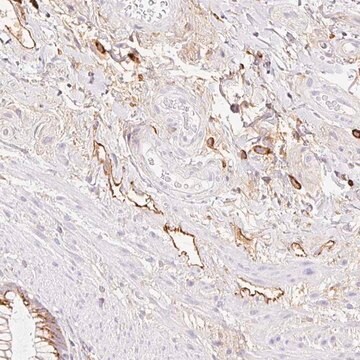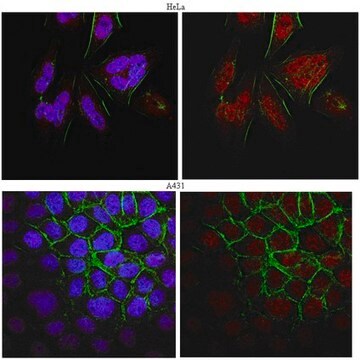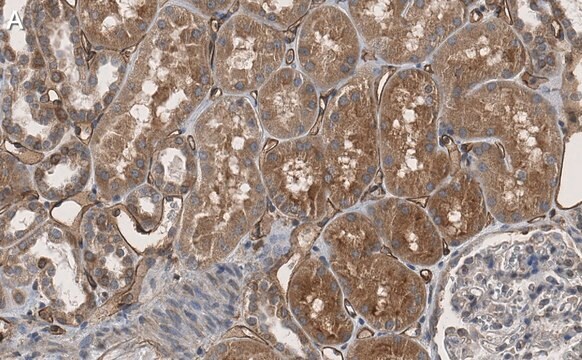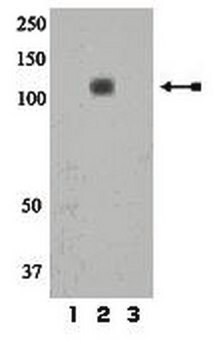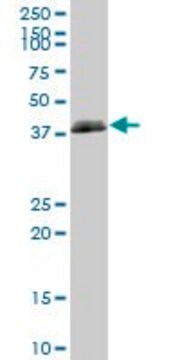MAB8672-I
Anti-HSV1-ICP8 Antibody, clone 10A3
clone 10A3, from mouse
Synonym(s):
Major DNA-binding protein, HSV1-ICP8, Infected cell protein 8
Sign Into View Organizational & Contract Pricing
All Photos(1)
About This Item
UNSPSC Code:
12352203
eCl@ss:
32160702
NACRES:
NA.41
Recommended Products
biological source
mouse
Quality Level
antibody form
purified immunoglobulin
antibody product type
primary antibodies
clone
10A3, monoclonal
species reactivity
virus
species reactivity (predicted by homology)
all
technique(s)
western blot: suitable
isotype
IgG1κ
UniProt accession no.
shipped in
ambient
target post-translational modification
unmodified
General description
Major DNA-binding protein (UniProt: P04296) is encoded by DBP (also known as Infected cell protein 8, ICP8, UL29) gene (Gene ID: 2703458) in human herpes simplex virus 1. HSV1-ICP8 is a 128 kDa, single stranded DNA binding protein of the herpesviridae family. It is an essential replication factor for both Herpes Simplex Virus Type 1 (HSV-1) and Adeno-Associated Virus (AAV) DNA replication. It binds tightly and cooperatively to ssDNA and destabilizes dsDNA helices, promotes DNA strand transfer, and renaturation of ssDNA. ICP8 is reported to regulate viral gene expression by repressing transcription from the parental viral genome and stimulating gene expression from the progeny genome. It is known to associate in replication compartments with over 50 cellular and viral proteins-many of which are involved in DNA replication and repair, recombination, and chromatin modeling. In the absence of DNA replication, HSV1-ICP8 is found in the nuclear framework-associated structures (pre-replicative sites); however, as viral DNA replication proceeds, it migrates to globular intranuclear structures (replication compartments). (Ref.: Glauser, D.L., et al. (2007). J. Virol. 81(9): 4732-4743; Tolun, G., et al. (2013). Nucleic Acids Res. 41(11): 5927 5937).
Specificity
Clone 10A3 detects ICP-8 protein in human herpes simplex virus 1.
Immunogen
ICP8 purified from U-35-VERO cells.
Application
This mouse monoclonal Anti-HSV1-ICP8, clone 10A3 , Cat. No. MAB8672-I is validated for use in Western Blotting for the detection of Herpes Simplex Virus Infected cell protein 8.
Western Blotting Analysis: A representative lot detected HSV1-ICP8 in HeLa cells (Glauser, D.L., et. al. (2007). J Virol. 81(9):4732-43).
Quality
Evaluated by Western Blotting in using recombinant protein.
Western Blotting Analysis: A 1:5,000 dilution of this antibody detected 1.25 µg of 1CB8 recombinant protein.
Western Blotting Analysis: A 1:5,000 dilution of this antibody detected 1.25 µg of 1CB8 recombinant protein.
Target description
~128 kDa observed; 128.35 kDa calculated. Uncharacterized bands may be observed in some lysate(s).
Physical form
Format: Purified
Other Notes
Concentration: Please refer to lot specific datasheet.
Not finding the right product?
Try our Product Selector Tool.
Storage Class Code
12 - Non Combustible Liquids
WGK
WGK 1
Certificates of Analysis (COA)
Search for Certificates of Analysis (COA) by entering the products Lot/Batch Number. Lot and Batch Numbers can be found on a product’s label following the words ‘Lot’ or ‘Batch’.
Already Own This Product?
Find documentation for the products that you have recently purchased in the Document Library.
Fumio Maeda et al.
Journal of virology, 91(12) (2017-03-31)
Upon herpes simplex virus 1 (HSV-1) infection, the CD98 heavy chain (CD98hc) is redistributed around the nuclear membrane (NM), where it promotes viral de-envelopment during the nuclear egress of nucleocapsids. In this study, we attempted to identify the factor(s) involved
Zhuoming Liu et al.
Journal of virology, 89(17), 8982-8998 (2015-06-19)
To clarify the function(s) of the herpes simplex virus 1 (HSV-1) major virion structural protein UL47 (also designated VP13/14), we screened cells overexpressing UL47 for UL47-binding cellular proteins. Tandem affinity purification of transiently expressed UL47 coupled with mass spectrometry-based proteomics
Our team of scientists has experience in all areas of research including Life Science, Material Science, Chemical Synthesis, Chromatography, Analytical and many others.
Contact Technical Service
